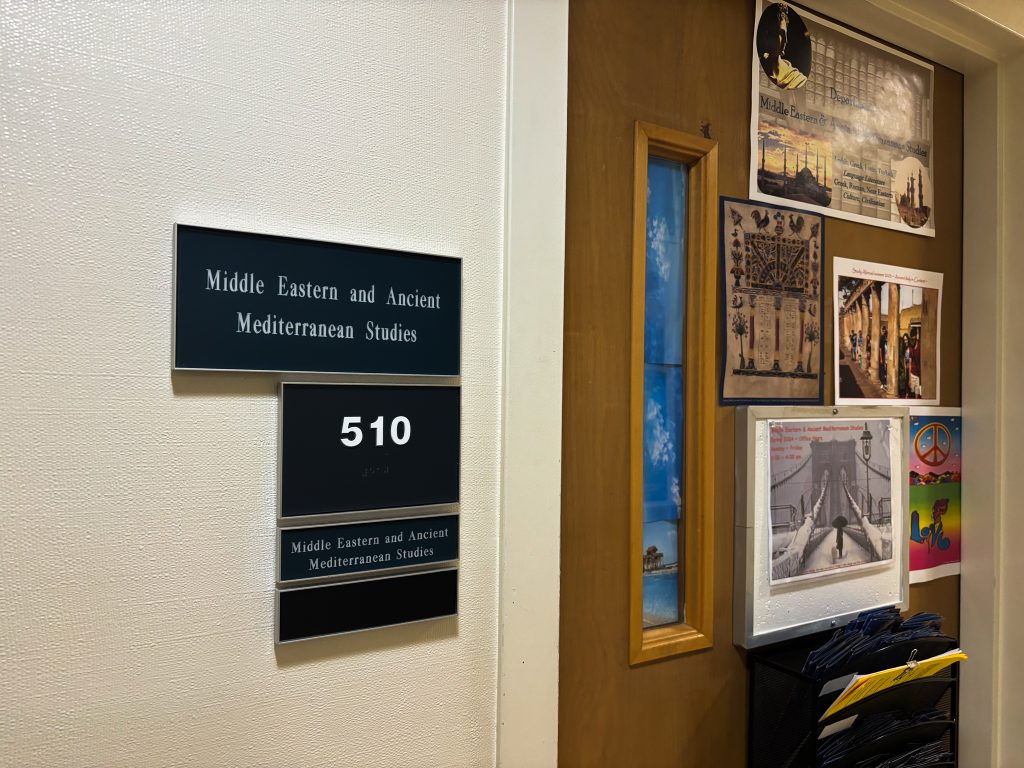A course offered by the Middle Eastern and Ancient Mediterranean Studies (MEAMS) department allows students to explore how gender and sexuality were perceived during ancient times.
The course, AMS 280S: Sex and Gender in Antiquity, is a two-semester course, referred to as a research stream, operating through the Source Project — a program that offers first-year students the chance to perform research in the humanities and social sciences. During the first semester of the course, students look into sources providing a historical perspective of gender and sexuality in ancient worlds, including North Africa and Greece. In the second semester, students work on chosen independent research projects related to areas covered in the course or from around the world.
Students also have a chance to collaborate on an exhibition in the Glenn G. Bartle Library lobby.
AMS 280S explores how gender and sexuality were defined and controlled, specifically in an Ancient Mediterranean context. The course investigates socially acceptable norms in gender expression, identity and sexual practices. It studies how extramarital relationships between men and subordinate women — because of the legitimacy of heirs and the belief that women were inferior to men — led to the heavy control of women’s sexual activities.
The course also delves into homosexual relationships between ancient figures, such as Achilles and Patroclus and Alexander the Great and Hephaestion.
Tina Chronopoulos, the instructor and an associate professor of Middle Eastern and ancient Mediterranean studies, explained that the class originated from two previous courses she taught centering around the Ancient Mediterranean region. This followed students’ interests in stories of sexual relationships and portrayals of femininity and masculinity, along with depictions of LGBTQ+ identities or relationships in the past. AMS 280S was devised to more broadly focus on gender and sexuality in the Ancient Mediterranean.
“My dream is for students to come away with the knowledge that gender and sexuality are deeply influenced by the culture and society we live in, both today and in the past,” Chronopoulos wrote in an email. “For instance, masculinity in ancient Rome looked very different from masculinity in ancient Greece and differed yet again from how men presented and understood themselves in Persia or Egypt.”
According to the syllabus, the class operates primarily through an interactive seminar rather than a lecture format. The majority of the course consists of group discussions of assigned readings and writing assignments, culminating in an individual poster project and a final paper. Reading topics include workers and drones, deviant teaching, male slave sexuality and ancient Amazons.
Chronopoulos mentioned topics she found interesting during students’ presentations in the course, including one highlighting how women’s reproductive health is discussed and understood dates back to ancient medicine. Greek medical authors were not lacking in their understanding, but rather the patriarchal nature of their societies deeply influenced their thinking. Another presentation focused on a Viking burial where a discovered skeleton was assumed to be a male warrior, but a DNA study found that it was actually female, revealing that gender identity is shaped by cultural and societal norms.
Students currently enrolled in the class, including Evelyn Polovich, a freshman majoring in classical studies, shared how the class taught them about gender and sexuality.
“I’ve learned a lot about the ideas behind historical women and how they were treated, and how some of that has continued and morphed over the years,” Polovich said. “We’ve also read a few translations of poems and letters and explored censorship of sexuality in that area. Another large aspect of the class last semester was presentations, [where] we all got different topics, and I ended up doing one [on] the concept of pederasty, which I had never really looked into before.”
Alexandra Levitt, another student in the course and a freshman majoring in politics, philosophy and law, mentioned how it helped her better understand the origins of modern societal problems.
“This class has absolutely flipped the way I thought about gender and sexuality on its head,” Levitt wrote in an email. “Understanding and recognizing the cultural roots of discrimination and genuinely seeing where it came from, undeniably makes the current issues feel very pertinent.”



